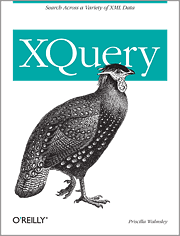Description
The functx:is-descendant function returns a boolean value indicating whether $node1 is a descendant of $node2.
Arguments and Return Type| Name | Type | Description |
|---|
$node1 |
node() |
the first node |
$node2 |
node() |
the second node |
| return value |
xs:boolean |
XSLT Function Declaration| See XQuery definition. | <xsl:function name="functx:is-descendant" as="xs:boolean"
xmlns:functx="http://www.functx.com">
<xsl:param name="node1" as="node()"/>
<xsl:param name="node2" as="node()"/>
<xsl:sequence select="
boolean($node2 intersect $node1/ancestor::node())
"/>
</xsl:function>
|
Examples<xsl:variable name="in-xml" as="item()*"> | | <authors>
<author>
<fName>Kate</fName>
<lName>Jones</lName>
</author>
<author>
<fName>John</fName>
<lName>Doe</lName>
</author>
</authors> |
| </xsl:variable> |
| XPath Example | Results |
|---|
functx:is-descendant(
$in-xml//author[1]/fName,
$in-xml//author[1]) |
true |
functx:is-descendant(
$in-xml//author[1],
$in-xml//author[1]/fName) |
false |
functx:is-descendant(
$in-xml//author[1]/fName/text(),
$in-xml//author[1]/fName) |
true |
functx:is-descendant(
$in-xml//author[1],
$in-xml//author[2]) |
false |
See AlsoHistory |
Recommended Reading: 
|

